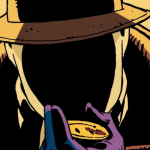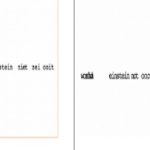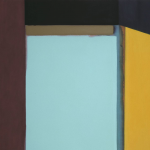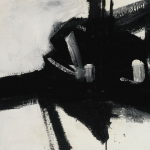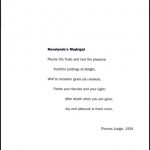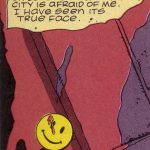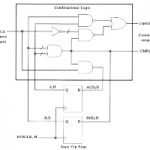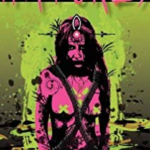2012
David Shepard heads off the discussion regarding Stephen Ramsay's live reading of Andrew Sorensen's "Strange Places." His initial contribution is followed with posts by Amanda French, Mark Marino, Max Feinstein, Jeremy Douglass, Daren Chapin, John Bell, Jeff Nyoff, Jennifer Lieberman, and Stephen Ramsay, as well as Andrew Sorensen himself.
This formulation by Joseph Tabbi is being reprinted with permission from the University of Minnesota Press's remixthebook. The original online version can be found here.
In this riposte, Marie-Laure Ryan suggests Lisa Swanstrom has 'flattened' the dimensions of her arguments about digital narrative as well as the dimensions of the digital experience itself.
Is 'media specific' e-lit criticism nothing but the last gasp of New Criticism and Deconstruction? Lee Konstantinou seems to think so, in this appreciation of the 'astute micro-analyses' (but critique of the theoretical basis) of Moulthrop's close reading/observation of Watchmen.
Dennis Cooper's disorienting novel, The Sluts, complicates reader expectations about subjectivity and identity. As a result, Megan Milks notes that it "is either the most honest or the most dishonest literature I have come across."
2011
In The American Epic Novel, Gilbert Adair presents a "State-of-the-Empire address" that interrogates the epical form in a time where authors no longer talk of writing "The Great American Novel." As Joseph Tabbi finds, such an exploration goes beyond expanding the canon and presents "a new, compelling context for 'the literary' itself."
In an increasingly monolingual, globalized world, the second volume of the Electronic Literature Collection may just offer a map of the territory. The question the reviewer, John Zuern, poses is how do we navigate this terrain going forward?
Just when you thought you were used to electronic literature, this critic makes the case for "beyond the screen" with a review of Jörgen Schäfer and Peter Gendolla's book of the same title, focusing on "transformations of literary structures, interfaces and genre."
From the heavens to the stars, the number three has often been tied to the occult. Carrying on this tradition, Rob Swigart has brought together three books that investigate the anomalous, address the unexplained, and answer the impossible. The truth is in here.
Too much about too little, and too little about too much. Reviewing the new critical collection Against the Grain: Reading Pynchon's Counternarratives, this critic finds evidence of overproduction in the "Pyndustry."
Literature joins the living dead. A critic illuminates Brian Lennon's "scene" of literature today: both suspended and emergent in the world system.
From early modern texts to "publishing events," Madeleine Monson-Rosen's review follows Matt Cohen's exploration of the "networked wilderness." It turns out that the English colonists and native Americans were already information theorists, centuries before cybernetics emerged at MIT.
Jussi Parikka interviews artist Zoe Beloff about her relationship to the emerging set of interdisciplinary theories and methodologies known as media archaeology. In way of response, Beloff discusses some past works, including: Lost (1995), Shadow Land (2000), Claire and Don in Slumberland (2002), Charming Augustine (2005), The Somnambulists (2008), and The Dream Films (2009).
How does a sample of de Quincey's Confessions of an English Opium Eater give birth to a mutant, six-fingered hand? This essay articulates the logic of Noon's 2001 experiment in constrained writing, which concretizes the play of signal and noise, pattern and randomness, in the flow of information. In the process, the critic suggests, Noon dramatizes how printed texts rupture and reassemble when they are transferred to electronic media.
Richard Kalich's latest protagonist is Richard Kalich, but one critic views this postmodern occupation of the novel as an opportunity - even an encouragement - to forget about him.
Engaged in his own kind of structured play, Stuart Moulthrop uses the concept of "under-language" to explore the boundaries, gutters, masked intentions, and hidden meanings of Moore and Gibbons' Watchmen, while simultaneously using the graphic novel to provide an equally complex, over-determined rendering of the term.
Reviewing the week's discussion of Programmed Visions, Sarah Zurhellen finds a pleasurable respite that, necessarily, generated as many questions as answers.
In Week 4, Critical Code Studies contributors kept the magic alive as they discussed Wendy Hui Kyong Chun's "On Sourcery and Source Codes," the first chapter of her forthcoming Programmed Visions: Software and Memory. Informed by Chun's psychoanalytic reading and her awareness of the materiality of code work, the conversation deals with fetishism, gender, genetics, and performativity in ways both abstract and tangible.
Beginning his review by reflecting on the book's cover art, John Bruni speculates that a punk aesthetic runs throughout Alaimo's posthuman environmentalism. Providing brief treatments of each chapter, he argues that the book's trans-corporeal understanding of the relationship between bodies and places disrupts "the very heart of what we know about ourselves."
In this review Veronica Vold charts the posthuman environmental ethic in Stacy Alaimo's Bodily Natures: Science, Environment, and the Material Self and notes how the text draws together issues of race, (dis)ability, and the environment in a way that disrupts the boundaries between bodies and places.
